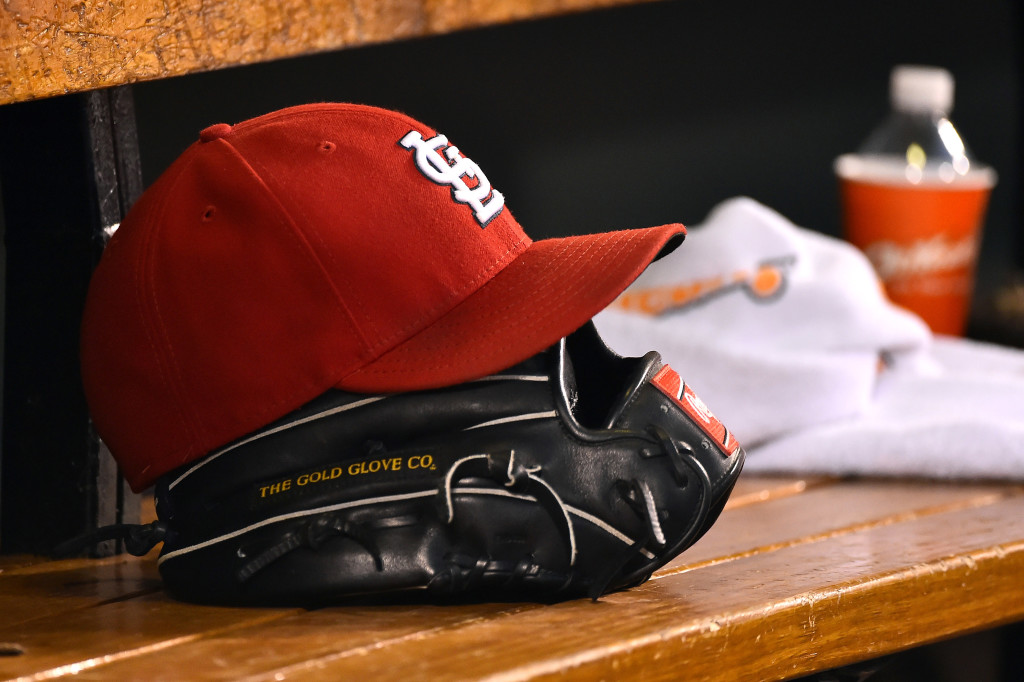Videodrome
Senior Member
My mother-in-law came over with some more masks that she had made. I asked her how many in total and before this rather large batch, she estimated that it was around 150 or so.
The St. Louis Cardinals baseball team has more positive cases of COVID-19:

Tuesday's Cardinals Game "Highly Unlikely" To Be Played
2:57pm: Indeed there are 13 total positives, including seven players, Jon Heyman of MLB Network tweets. 2:34pm: The Cards will not …www.mlbtraderumors.com
The Cardinals and the Marlins are competing to see which team has the most players tested positive for COVID-19.
If this continues, then we could no longer get live Major League Baseball for the rest of the year. After all, it's very difficult to convince young baseball players not to do stupid things and it's very difficult to get the entire team to wear face masks during a game.
As the United States (and Canada) and other countries anxiously consider how to reopen schools, Israel, one of the first countries to do so, illustrates the dangers of moving too precipitously.
Confident it had beaten the coronavirus and desperate to reboot a devastated economy, the Israeli government invited the entire student body back in late May.
Within days, infections were reported at a Jerusalem high school, which quickly mushroomed into the largest outbreak in a single school in Israel, possibly the world.
The virus rippled out to the students’ homes and then to other schools and neighborhoods, ultimately infecting hundreds of students, teachers and relatives.
Other outbreaks forced hundreds of schools to close. Across the country, tens of thousands of students and teachers were quarantined.
Israel’s advice for other countries?
“They definitely should not do what we have done,” said Eli Waxman, a professor at the Weizmann Institute of Science and chairman of the team advising Israel’s National Security Council on the pandemic. “It was a major failure.”
The lesson, experts say, is that even communities that have gotten the spread of the virus under control need to take strict precautions when reopening schools. Smaller classes, mask wearing, keeping desks six feet apart and providing adequate ventilation, they say, are likely to be crucial until a vaccine is available.
“If there is a low number of cases, there is an illusion that the disease is over,” said Dr. Hagai Levine, a professor of epidemiology at Hebrew University-Hadassah School of Public Health. “But it’s a complete illusion.”
“The mistake in Israel,” he said, “is that you can open the education system, but you have to do it gradually, with certain limits, and you have to do it in a very careful way.”
The United States is facing similar pressures to fully reopen schools, and President Trump has threatened to withhold funding for districts that don’t reopen. But the U.S. is in a far worse position than Israel was in May: Israel had fewer than 100 new infections a day then. The U.S. is now averaging more than 60,000 new cases a day, and some states continue to set alarming records.
Israel’s handling of the pandemic was considered successful at first. The country of nine million quickly closed its borders, shuttered schools in mid-March and introduced remote learning for its two million students. In April, Passover and Ramadan were celebrated under lockdown.
By early May, infection rates had fallen from more than 750 confirmed cases a day to double digits. The youngest students, grades three and under, and older students taking final exams returned in small groups, splitting the week to take turns using classrooms.
Then, emboldened by the dropping infection rates, the government completely reopened schools on May 17, the day a new government was sworn in.
In his inaugural speech, Prime Minister Benjamin Netanyahu promised a new budget that would deliver three things: “Jobs, jobs, jobs.” His new education minister, Yoav Gallant, said that the school system’s “immediate mission” was to allow parents to return to work with peace of mind.
Inna Zaltsman, an Education Ministry official, said administrators also wanted “to return the children to routine as much as possible, for their emotional and pedagogic well-being.”
Shopping malls, outdoor markets and gyms had already reopened, and soon houses of worship, restaurants, bars, hotels and wedding halls did too. Mr. Netanyahu told Israelis to grab a beer and, while taking precautions, “Go out and have a good time.”
In hindsight, that advice was wildly premature.
That same day, a mother phoned a teacher at Jerusalem’s historic Gymnasia Ha’ivrit high school. Her son, a seventh-grade student there, had tested positive for the virus.
By the next day, the school confirmed another case in the ninth grade. Ultimately, Israeli officials said, 154 students and 26 staff members were found to be infected...
...Israel has already moved in that direction.
The government recently appointed a coronavirus czar, Dr. Ronni Gamzu, who transferred responsibility for virus testing and investigation from the Health Ministry to the military. “This is an operation, not medicine,” he declared.
On Sunday, the government approved plans for returning only grades two and lower to school in full-size classes in the fall. Younger children are less likely to become seriously ill, and some studies have suggested that they are less likely than adults and teenagers to transmit the virus to others.
The plans also call for splitting older students into capsules of 18 and for mostly online instruction for grades five and above. Principals will have flexibility to adjust their school’s policies based on local conditions.
Even those measures may not be enough.
Menashe Levy, president of the Israeli High School Principals Association, arranged desks six feet apart in a standard classroom. It could accommodate 14 students, not 18.
But Israel is plunging ahead. Only one option has been ruled out: closing the schools.
“This is a long-term pandemic,” said Dr. Nadav Davidovitch, a pandemic policy adviser to the government. “We cannot close schools for a year.”
The NBA season has finally resumed after nearly five months of pandemic-mandated downtime, thrilling fans who can get more involved in games than ever before — even despite a physical ban on all human spectators.
Up to 320 "virtual fans" are invited to attend each game inside the NBA bubble at Disney World for the remainder of the shortened season.
You may have noticed them already, flickering on 17-foot-tall boards surrounding the court, behind player benches. They're hard to miss.
Powered by Microsoft Teams, the virtual fan experience functions somewhat like a giant Zoom call, but one where participants appear to be sitting in individual stadium seats... with inconsistently sized heads, bodies and body parts.
Virtual fans can see the game live, and be seen by both players on the court and in the background of games by anyone watching at home, making those 320 spots incredibly visible — and coveted.
Who wouldn't want a chance to sit next to Chris Bosh while catching a game for free?
If you're looking to become an NBA virtual fan at a Toronto Raptors game, I've got good and bad news.
The good is that it's totally possible. The bad news is that MLSE, which owns the Raptors, isn't providing much information about how regular fans (as opposed to, say, employees or corporate season ticket holders) can get seats.
According to the NBA, it's up to each individual team to determine how to use the virtual seats for their home games. The 320 seats per game are divided into 10 sections of 32, with the league itself reserving one of those sections for players' family members and other VIPs.
Another section is reserved by Michelob, the program's title sponsor, for contest winners (American only), leaving eight sections open for the Raptors to fill with virtual bodies and heads.
Unlike the Heat or the Pacers, both of which have registration pages set up for people to reserve a digital spot, the Raptors haven't put out any sort of public call for virtual fans.
Multiple people on Twitter have admitted to scoring spots by either being or being close to an MLSE employee, but that doesn't mean you're out of luck as a regular NBA diehard.
The NBA has released a step-by-step guide for joining the waiting room to be selected for a game. You'll need to download Microsoft Teams, have a working webcam and microphone, and you need to be able to stay for the full game.
If you do get in, be warned: A moderator can easily eject you for misbehaving, just like a security guard could kick you out at the Scotiabank Arena. You can also get the boot for an extended period of inactivity.
There's no guarantee you'll be chosen to help fill the virtual NBA stands, but there's no harm in trying.
The Raptors face off against the Orlando Magic tomorrow night at 8 p.m., but Toronto's next home game (aka your chance to score a seat in the virtual stands) is this Friday at 9 p.m.

Well, we can wear masks and avoid crowds for a while, or we can risk going back under significant lockdown like they're doing in Australia, where you can't leave your house except for some very specific situations. We have a choice.
Would you rather get ill, and/or see your parents or grandparents or immuno-compromised friends die? The precautions are to try to keep people safe. Nobody is enjoying this 'new normal' but ...True but at the same time limiting everything for 2-3 years seems excessive. Do you really think keeping the borders closed for 2-3 years is a good idea?
The contract tracing app only works on new phones.

Canada's new COVID app won't work on older iPhones, Android devices
The federal government's COVID-19 contact tracing app is facing criticism for its download requirements, which restrict some Canadians from accessing and using the app.www.cp24.com
I'm 68 - didn't realize I'm part of a marginalized group. I suppose I should demand that the government buy me a new phone, oh, and a data plan since I don't have one, then give me a sat phone for when I'm out of coverage.
I sometimes wonder about people who find fault in every single thing - life and society is never good enough for their apparently perfect lives.
Would you rather get ill, and/or see your parents or grandparents or immuno-compromised friends die? The precautions are to try to keep people safe. Nobody is enjoying this 'new normal' but ...
Do you really think keeping the borders closed for 2-3 years is a good idea?




